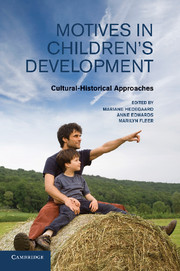Book contents
- Frontmatter
- Contents
- Figures
- Introduction
- Part One Motives, Emotions and Development
- Part Two Cultural Practice Motives and Development
- Part Three Creating Conditions for Children’s Engagement
- 10 Expertise in the Children’s Workforce
- 11 Changing Situations and Motives
- 12 A Conceptual Perspective for Investigating Motive in Cultural-Historical Theory
- Index
- References
10 - Expertise in the Children’s Workforce
Knowledge and Motivation in Engagement with Children
from Part Three - Creating Conditions for Children’s Engagement
Published online by Cambridge University Press: 05 November 2011
- Frontmatter
- Contents
- Figures
- Introduction
- Part One Motives, Emotions and Development
- Part Two Cultural Practice Motives and Development
- Part Three Creating Conditions for Children’s Engagement
- 10 Expertise in the Children’s Workforce
- 11 Changing Situations and Motives
- 12 A Conceptual Perspective for Investigating Motive in Cultural-Historical Theory
- Index
- References
Summary
Motives and Expertise in Professional Practices
In this chapter the gaze turns to the work practices in settings which provide education and care and in which children create social situations of development. These practices are seen as historically formed, imbued with knowledge, freighted with emotion and shaped by the values and purposes of the institutions in which they are located. It is in these practices that the practitioner identities that mediate workers’ engagement with children are formed. These practices are therefore part of, what Taylor (1995) has called, the ‘background’ from which people’s engaged agency emerges. The very circularity of this account means that opening up the practices of educationally oriented work with children to conscious reflection (Flyvbjerg, 2001) is likely to be worthwhile. In the discussion that follows, the conscious reflection will focus on knowledge and motives in practitioners’ work with children.
My use of the term ‘motive’ draws on the work of A. N. Leont’ev on the object of activity. Interweaving motives, goals and social conditions to overcome the dualism of contemporary mainstream psychology, he argued that ‘society produces the activity of the individuals forming it’ (Leont’ev, 1978a, p. 7). A key to the dialectic between people and activity in society was the object of activity, which gives rise to the object motive, that directs the participation of the actors in activities. He explained: ‘The main thing that distinguished one activity from another, however, is the difference in their objects. It is exactly the object of activity, that gives it a determined direction. According to the terminology I have proposed, the object of activity is its true motive’ (Leont’ev, 1978a, p. 17). However, for Leont’ev, the dialectic of person and object was crucial in the determining of direction: ‘[T]he object of activity is twofold: first in its independent existence as subordinating to itself and transforming the activity of the subject; second, as an image of the object, as a product of its property of psychological reflection that is realized as an activity of the subject and cannot exist otherwise’ (Leont’ev, 1978a, p. 7). His recognition of the agency of the actor which realises the ideal of the object of activity reminds us that starting with practices in analyses of workplaces does not mean that we should expect to find that participants are simply swept along by the practices they inhabit. Instead, the understandings that are brought into play in realising objects in activities in practices have the potential to sustain a dynamic which ensures that practitioners engage and re-engage with the knowledge that matters in the practice. This expectation means that attention to professional knowledge and how it is engaged with needs to be part of the examination of workplace practices. The proposition is that the knowledge in professional practices is not static, but is part of what practitioners work on as they also work on the objects of their activity. What that knowledge is and what potential it holds for the development of a profession will, as we shall see, depend on the object of activity that is selected and the motives that are recognised in it.
- Type
- Chapter
- Information
- Motives in Children's DevelopmentCultural-Historical Approaches, pp. 173 - 190Publisher: Cambridge University PressPrint publication year: 2011



